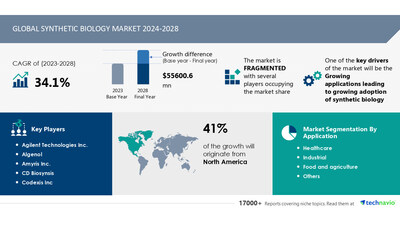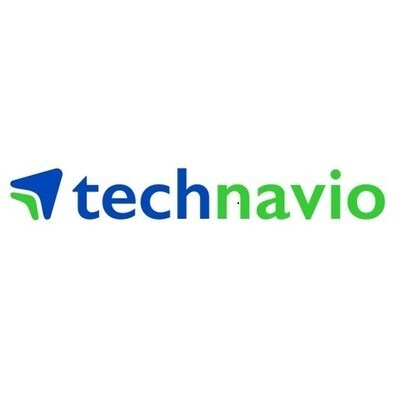NEW YORK, Sept. 19, 2024 /PRNewswire/ — Report with the AI impact on market trends- The global synthetic biology market size is estimated to grow by USD 55.60 billion from 2024-2028, according to Technavio. The market is estimated to grow at a CAGR of over 34.1% during the forecast period. Growing applications leading to growing adoption of synthetic biology is driving market growth, with a trend towards evolving regulatory framework around synthetic biology. However, technical challenges poses a challenge. Key market players include Agilent Technologies Inc., Algenol, Amyris Inc., CD Biosynsis, Codexis Inc, Creative Biogene, Danaher Corp., Eurofins Scientific SE, Genomatica Inc., GenScript Biotech Corp., Ginkgo Bioworks Holdings Inc., Illumina Inc., Merck KGaA, New England Biolabs Inc., Novozymes AS, Precigen Inc., Sanofi SA, Synthego Corp., Thermo Fisher Scientific Inc., and Twist Bioscience Corp..
AI-Powered Market Evolution Insights. Our comprehensive market report ready with the latest trends, growth opportunities, and strategic analysis- View your snapshot now
|
Forecast period |
2024-2028 |
|
Base Year |
2023 |
|
Historic Data |
2018 – 2022 |
|
Segment Covered |
Application (Healthcare, Industrial, Food and agriculture, and Others), Product (Oligonucleotides, Enzymes, Cloning technology kits, Xeno-nucleic acids, and Chassis organism), and Geography (North America, Europe, Asia, and Rest of World (ROW)) |
|
Region Covered |
North America, Europe, Asia, and Rest of World (ROW) |
|
Key companies profiled |
Agilent Technologies Inc., Algenol, Amyris Inc., CD Biosynsis, Codexis Inc, Creative Biogene, Danaher Corp., Eurofins Scientific SE, Genomatica Inc., GenScript Biotech Corp., Ginkgo Bioworks Holdings Inc., Illumina Inc., Merck KGaA, New England Biolabs Inc., Novozymes AS, Precigen Inc., Sanofi SA, Synthego Corp., Thermo Fisher Scientific Inc., and Twist Bioscience Corp. |
Key Market Trends Fueling Growth
Synthetic biology, a technique used by companies in various industries for several years, necessitates a changing regulatory landscape. With the increasing application of this technology, governments worldwide focus on creating clear guidelines and stringent regulations to address biosecurity and biosafety concerns. The United Nations Convention on Biological Diversity (CBD) involves 196 countries in establishing a global framework for synthetic biology. In Europe and North America, significant progress has been made, with the US Toxic Substances Control Act (TSCA) regulating potential human health and environmental impacts. Europe has a multi-tiered regulatory policy, while developing countries in Asia Pacific struggle with ambiguity due to a lack of clear definitions and applications. The evolving regulatory framework is crucial for market growth, fostering innovation, and ensuring product safety and efficacy.
Synthetic Biology is a dynamic and innovative industry, focusing on designing and engineering biological systems using DNA sequencing and synthesizing techniques. Trends include creating synthetic organisms, antibiotic-resistant superbug solutions, and novel therapeutics. Biosafety, biosecurity, and ethical concerns are crucial, as we explore synthetic DNA, enzymes, and cloning technology kits. Synthetic cells, chassis organisms, and xeno-nucleic acids are driving advancements in medical and environmental applications. Companies like Modern Meadow, Bolt Threads, and Vitro Labs leverage artificial intelligence and machine learning to unlock biological phenomena. The synthetic DNA segment, genome editing, bio-foundries, and natural resources are key areas of investment. Infrastructure and policies, public-private partnerships, and multilateral cooperation are essential for growth. Key players include SynBioBeta, Arbor Biotechnologies, DNA Script, and Creative Biogene. PCR and real-time PCR assays are crucial tools for research and development. The market is vast, with opportunities in pharmaceuticals, biotechnology, biofuel production, and more.
Insights on how AI is driving innovation, efficiency, and market growth- Request Sample!
Market Challenges
- Synthetic biology, while offering immense potential, presents unique challenges for companies in the market. Biological systems are complex and unpredictable compared to engineered systems like automobiles or computers. Researchers face difficulties in working at the molecular and cellular levels due to the infinite complexity of living organisms. The transition from cellular to system levels, such as producing engineered tissues, adds to the complexity. Reliable biological parts exist but are underutilized due to a lack of knowledge on how to use them effectively. Rationally designing organisms is still in its infancy, and the full potential of synthetic biology applications remains undiscovered. Genetic circuits, which consist of interacting proteins and genes, are essential but often embedded in other complex circuits, making it difficult to understand and study their core design. These technical challenges hinder the growth of the global synthetic biology market.
- Synthetic Biology is a rapidly growing industry with significant potential for innovation in healthcare and agriculture. However, R&D investments remain a challenge for both biopharmaceutical companies and academic research institutions. Strategic investment from firms like Casdin Capital and Sumitomo Chemical is crucial for advancing technology in this field. Market concentration is a concern, but the Synthetic Biology Hub aims to foster collaboration and innovation. Advancing technology holds promise for addressing healthcare issues such as sickle cell anemia, cystic fibrosis, and cancer at the DNA level. However, regulatory hurdles, safety concerns, ethical use, and compliance difficulties must be addressed. Synthetic biology tools offer potential for advanced diagnostics, personalized treatments, and regenerative medicine. In agriculture, synthetic biology offers opportunities for cellular engineering in livestock and crop cultivation. However, high drug development costs and pharmaceutical investment remain significant challenges. The industry also faces public perception issues and the need for proof of concept in areas like 3D printing of living tissues, therapeutic proteins, antibodies, vaccines, and biological pathways. Overall, the synthetic biology market is poised for growth, but navigating these challenges is essential for success.
Insights into how AI is reshaping industries and driving growth- Download a Sample Report
Segment Overview
This synthetic biology market report extensively covers market segmentation by
- Application
- 1.1 Healthcare
- 1.2 Industrial
- 1.3 Food and agriculture
- 1.4 Others
- Product
- 2.1 Oligonucleotides
- 2.2 Enzymes
- 2.3 Cloning technology kits
- 2.4 Xeno-nucleic acids
- 2.5 Chassis organism
- Geography
- 3.1 North America
- 3.2 Europe
- 3.3 Asia
- 3.4 Rest of World (ROW)
1.1 Healthcare- The Synthetic Biology market refers to the application of engineering principles to design and construct new biological parts, devices, and systems. This field holds significant potential for creating innovative solutions in various industries, including healthcare, agriculture, and energy. Companies are investing in synthetic biology to develop new products, improve existing processes, and address global challenges. The market is expected to grow steadily due to increasing demand for sustainable and cost-effective solutions. Businesses can leverage synthetic biology to enhance their competitive edge and drive innovation.
Download complimentary Sample Report to gain insights into AI’s impact on market dynamics, emerging trends, and future opportunities- including forecast (2024-2028) and historic data (2018 – 2022)
Research Analysis
Synthetic Biology is an emerging field that combines engineering principles with biology to design and create new biological parts, devices, and systems. Buying behavior in this market is driven by advancements in DNA sequencing and synthesizing technologies, enabling the creation of synthetic organisms and biomolecules. However, concerns around biosafety, biosecurity, and ethics persist, as the creation of synthetic organisms and gene-editing technologies pushes the boundaries of scientific research. Multiplexed diagnostics and cellular recording are key applications of synthetic biology, offering faster and more accurate disease detection. In the pharmaceutical industry, synthetic DNA and RNA development are revolutionizing drug discovery, while genome engineering and gene-editing technologies are transforming therapeutic applications. Biofuel production is another significant vertical, with companies like Modern Meadow and Bolt Threads using synthetic biology to create sustainable alternatives to traditional materials. Biomaterials, medical devices, and biopharmaceutical companies are also leveraging synthetic biology for innovation and growth. Synthetic biology is poised to disrupt various industries, from healthcare to agriculture, and its potential applications are vast. As the field continues to evolve, ethical, regulatory, and societal considerations will be crucial in shaping its future.
Market Research Overview
Synthetic Biology Market: A Rapidly Evolving Industry Synthetic Biology, a revolutionary field that combines engineering principles with biology, is transforming various industries. Buying behavior in this market is driven by advancements in DNA sequencing, synthesizing, and the design objective of creating novel organisms and biological phenomena. The synthetic DNA segment, including enzymes and cloning technology kits, is a significant component. Synthetic cells, chassis organisms, and xeno-nucleic acids are also gaining traction. Applications span from medical to environmental, including novel therapeutics, fuel alternatives, multiplexed diagnostics, cellular recording, and therapeutic genome editing. Companies are investing heavily in R&D, collaborating through public-private partnerships, multilateral cooperation, and strategic investments. However, biosafety, biosecurity, and ethical concerns persist. The rise of antibiotic-resistant superbugs adds urgency to these debates. Advancing technology also presents regulatory hurdles, especially in areas like gene editing and genetically modified organisms. Key applications include pharmaceuticals, biotechnology, biofuel production, and the agricultural sector. Companies like Modern Meadow, Bolt Threads, Vitro Labs, SynBioBeta, Arbor Biotechnologies, DNA Script, and others are pioneering innovations. Artificial intelligence and machine learning are integral to synthetic biology, enabling faster data analysis and design. Biological phenomena like gene editing technology, genomics, gene-editing technologies, and biomaterials are at the forefront of this transformation. Infrastructure and policies, natural resources, and creative biotechnology companies are essential components of this ecosystem. Market concentration is increasing, with key players like Casdin Capital, Sumitomo Chemical, SynBio Hub, and others making strategic investments. Healthcare issues, such as diseases like sickle cell anemia, cystic fibrosis, and cancer, are driving research at the DNA level, decoding genetic codes from bacterial genomes, and proving concept through regulatory hurdles.
Table of Contents:
1 Executive Summary
2 Market Landscape
3 Market Sizing
4 Historic Market Size
5 Five Forces Analysis
6 Market Segmentation
- Application
- Healthcare
- Industrial
- Food And Agriculture
- Others
- Product
- Oligonucleotides
- Enzymes
- Cloning Technology Kits
- Xeno-nucleic Acids
- Chassis Organism
- Geography
- North America
- Europe
- Asia
- Rest Of World (ROW)
7 Customer Landscape
8 Geographic Landscape
9 Drivers, Challenges, and Trends
10 Company Landscape
11 Company Analysis
12 Appendix
About Technavio
Technavio is a leading global technology research and advisory company. Their research and analysis focuses on emerging market trends and provides actionable insights to help businesses identify market opportunities and develop effective strategies to optimize their market positions.
With over 500 specialized analysts, Technavio’s report library consists of more than 17,000 reports and counting, covering 800 technologies, spanning across 50 countries. Their client base consists of enterprises of all sizes, including more than 100 Fortune 500 companies. This growing client base relies on Technavio’s comprehensive coverage, extensive research, and actionable market insights to identify opportunities in existing and potential markets and assess their competitive positions within changing market scenarios.
Contacts
Technavio Research
Jesse Maida
Media & Marketing Executive
US: +1 844 364 1100
UK: +44 203 893 3200
Email: [email protected]
Website: www.technavio.com/
![]() View original content to download multimedia:https://www.prnewswire.com/news-releases/synthetic-biology-market-to-grow-by-usd-55-60-billion-2024-2028-ai-driven-innovations-boost-adoption-and-market-revenue–technavio-report-302253171.html
View original content to download multimedia:https://www.prnewswire.com/news-releases/synthetic-biology-market-to-grow-by-usd-55-60-billion-2024-2028-ai-driven-innovations-boost-adoption-and-market-revenue–technavio-report-302253171.html
SOURCE Technavio

Featured Image: Megapixl @ Motorolka







